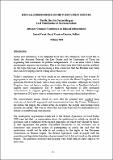| dc.description.abstract |
Reseña:It is sometimes said that a democratically elected legislature is not enough toguarantee the freedom of citizens – that what is needed is both democracy and therule of law. Perhaps both are part of each other. The rule of law is a phrase whichcan be overused to the point at which it appears to lose meaning. It sometimes seemsto be used as a synonym for “law and order” or as an adjunct to support for policing.While those are indeed aspects of it, the idea of the rule of law is much richer andwider than that. In the common-law world it can be traced back to Magna Carta in1215. It featured strongly in the Bill of Rights in 1689 and the Act of Settlement 1701.It is to be found in article 6 of the Constitution of the United States of America and inthe French Declaration of the Rights of Man and the Citizen 1789. Aspects of the ruleof law form part of the Universal Declaration of Human Rights 1948 and theConstitutional Reform Act 2005 recognises the rule of law as a constitutionalprinciple throughout the United Kingdom.That may sound like an excellent pedigree but what does the rule of law reallymean? What would happen if we lost it? I would characterise it as having threeessential features. First, the individual is protected from interference by the stateother than in accordance with law, second the same law applies to everyoneregardless of their position in society and third the content of laws must respectfundamental principles of transparency and fairness. The rule of law is not,therefore, empty rhetoric. It is not just an empty formalism that says “rules is rules”.In its full sense, it is absolutely fundamental to the exercise of the rights andguarantee the freedom of citizens – that what is needed is both democracy and therule of law. Perhaps both are part of each other. The rule of law is a phrase whichcan be overused to the point at which it appears to lose meaning. It sometimes seemsto be used as a synonym for “law and order” or as an adjunct to support for policing.While those are indeed aspects of it, the idea of the rule of law is much richer andwider than that. In the common-law world it can be traced back to Magna Carta in1215. It featured strongly in the Bill of Rights in 1689 and the Act of Settlement 1701.It is to be found in article 6 of the Constitution of the United States of America and inthe French Declaration of the Rights of Man and the Citizen 1789. Aspects of the ruleof law form part of the Universal Declaration of Human Rights 1948 and theConstitutional Reform Act 2005 recognises the rule of law as a constitutionalprinciple throughout the United Kingdom. That may sound like an excellent pedigree but what does the rule of law reallymean? What would happen if we lost it? I would characterise it as having threeessential features. First, the individual is protected from interference by the stateother than in accordance with law, second the same law applies to everyoneregardless of their position in society and third the content of laws must respectfundamental principles of transparency and fairness. The rule of law is not,therefore, empty rhetoric. It is not just an empty formalism that says “rules is rules”.In its full sense, it is absolutely fundamental to the exercise of the rights andfreedoms of each of us. |

